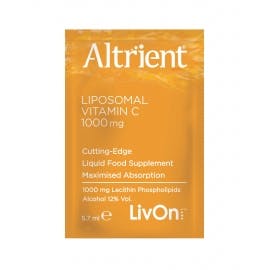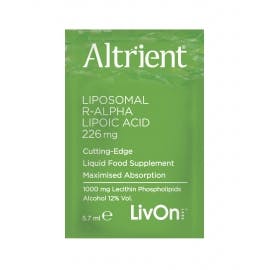A Happier Diabetic Christmas with Atrient C and Alpha Lipoic Acid
If you’re diabetic or pre-diabetic, Christmas requires a hefty dose of willpower, which isn’t always readily available! Discover how supplements like Liposomal Altrient C and Liposomal Alpha-Lipoic Acid (ALA) can offer essential support during this tricky time.
Diabetic dilemmas
The party season inevitably brings lots of temptations and the majority of us have a hard time resisting the sugar-laden Christmas treats. But for diabetics the consequences are far more serious than a few extra pounds. Controlling blood sugar levels is a daily battle with this condition and it certainly doesn’t get any easier over the Christmas holidays.
Insulin info
People with diabetes either can’t make enough insulin or the insulin they do produce is ineffective which results in increased sugar in the blood. Constantly elevated blood sugar levels trigger glycosylation, a cascade of reactions that damages proteins in the small blood vessels in the eyes, nerves, kidneys and larger blood vessels in the legs, heart and brain. This process can lead to some very serious health issues for diabetics so managing blood sugar levels helps to reduce the risk of complication such as glaucoma, cataracts, diabetic retinopathy, stroke, neuropathy (nerve damage), kidney disease, high blood pressure and heart disease.
Vitamin C and diabetes
Diabetes increases oxidative stress and free radical damage which consequently damages the body’s antioxidant defences. Vitamin C is a primary antioxidant and research shows that type 2 diabetic patients have at least 30 per cent lower levels of vitamin C than those without diabetes. These statistics suggests that vitamin C supplementation could be of great benefit for diabetics. Altrient C contains a highly absorbable and bioactive liposomal form of vitamin C making it one of the best supplements of vitamin C currently available. Further research shows that supplementing with high doses of vitamin C (1000mg/d), helps reduce the risk of diabetic complications in several ways including:
improving insulin sensitivity and blood vessel health in patients with coronary heart disease.
preventing sorbitol from accumulating in cells, which can damage tiny blood vessels in the eye.
reducing the development of type 2 diabetes by inhibiting insulin resistance and reducing oxidative stress.
improving the synthesis of collagen, an important component of cartilage, skin tissue and blood vessels.
Alpha Lipoic Acid and diabetes
Alpha lipoic acid, also known as ALA, is used in Europe to help support and prevent complications associated with diabetes such as cataracts, macular degeneration and neuropathy. Researchers have found that ALA enhances sugar uptake and may help diabetics reduce their reliance on insulin. In fact, supplementing with ALA has been shown to increase insulin sensitivity by 18-20 per cent and improve acute symptoms. In fact, in some European countries like Germany Alpha Lipoic Acid is medically approved in Germany for as a clinical protocol for adult onset type 2 diabetes.
Choose liposomal forms of vitamin C and ALA
Give yourself an extra happy Christmas and get started on Altrient C and Altrient R-ALA. The technology behind these dynamic liposomal nutrients makes them the most bioavailable supplements on the market delivering maximised absorption. Now you can sail through Christmas knowing that you have the most powerful antioxidant protection on your side.
Mitochondria re-charge
It has been suggested that insulin resistance and high blood sugar - the hallmarks of type 2 diabetes - are caused by mitochondrial dysfunction. Research shows that combining ALA with Acetyl L-Carnitine brings even greater benefits as this dynamic combination helps improve mitochondrial function.
Healthy blood sugar balance
Maintaining a healthy weight, exercising regularly and controlling blood sugar levels is extremely important. This careful approach is equally important during Christmas, but needn’t completely ruin your festive fun, so long as you don’t throw caution to the wind! Here are some diabetes dietary do’s and don’ts to help you manage your blood sugar this Christmas, alongside supplementing with Altrient C and Altrient ALA.
Diabetes Dietary Do’s | Diabetes Dietary Don’ts |
|
|
By Jacqueline Newson BSc (Hons) Nutritional Therapy
References
- Afkhami-Ardekani M, Shojaoddiny-Ardekani A. Effect of vitamin C on blood glucose, serum lipids and serum insulin in type 2 diabetes patients. Indian J Med Res. 2007;126(5):471-4.
American Diabetes Association. http://www.diabetes.org/diabetes-basics/myths/?loc=db-slabnav [accessed 6.1.18.]
Ansar H, Hejazi N, Kazemi F and Mazloom Z. Effect of alpha-lipoic acid on blood glucose, insulin resistance and glutathione peroxidase of type 2 diabetic patients. Saudi Med J. 2011; 32(6):584-8.
Bradley R and Walter B. Alpha lipoic acid. Diabetes Research and Action Education Foundation 2012. https://diabetesaction.org/article-alpha-lipoic-acid/ [accessed 14.11.18].
Creager P et al. Vitamin C improves endothelium-dependent vasodilation in patients with insulin-dependent diabetes mellitus. J Am Coll Cardiol 1998.
Ceriello A, Esposito K, Giugliano D, Ihnat M, Thorpe J. Long-Term Glycemic Control Influences the Long-Lasting Effect of Hyperglycemia on Endothelial Function in Type 1 Diabetes, The Journal of Clinical Endocrinology and Metabolism 2009; 94 (8) 2751–2756.
Chaudhari HV, Dakhale GN , Shrivastava M. Supplementation of vitamin C reduces blood glucose and improves glycosylated hemoglobin in type 2 diabetes mellitus: a randomized, double-blind study. Adv Pharmacol Sci. 2011:195271.
Darshika J, David C, Girgis CM and Gunton JE. Effects of vitamins C and D in type 2 diabetes mellitus. Nutrition and Dietary Supplements 2015; 7: 21-28.
De Leeuw I, Simoens L Van den Enden M and Vertommen J. Flavonoid treatment reduces glycation and lipid peroxidation in experimental diabetic rats. Phytotherapy Research 1994; 8: 430 - 432.
English J. Alpha Lipoic Acid. Nutrition Review. https://nutritionreview.org/2013/04/lipoic-acid/ [accessed 14.11.18].
Kern HJ and Mitmesser SH. Role of nutrients in metabolic syndrome: a 2017 update. Nutrition and Dietary Supplements; 2018:10 13–26
Na L, Shan R, Zhou C, et al. Dietary Vitamin C Intake Reduces the Risk of Type 2 Diabetes in Chinese Adults: HOMA-IR and T-AOC as Potential Mediators. PLoS One. 2016;11(9):e0163571.
National Institute of Diabetes and Digestive and Kidney Diseases. Diabetes. https://www.niddk.nih.gov/health-information/diabetes/overview/diet-eating-physical-activity [accessed 13.11.18].
- Yasue H et al. Improvement of endothelial function and insulin sensitivity with vitamin C in patients with coronary spastic angina: Possible role of reactive oxygen species. Journal of the American College of Cardiology 2000; 35, 7:1860-1866.





